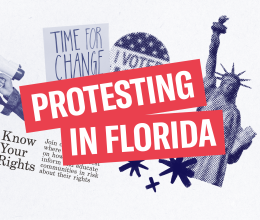
FOR IMMEDIATE RELEASE:
September 21, 2010
CONTACT:
Brandon Hensler, Director of Communications, (786) 363-2737 or media@aclufl.org; or Randall Berg, Florida Justice Institute, (305) 358-2081, ext. 225 or RBerg@FloridaJusticeInstitute.org
PENSACOLA, Fla. – The American Civil Liberties Union of Florida (ACLU) and the Florida Justice Institute (FJI) today announced the filing of a federal class action lawsuit against the Santa Rosa County Sheriff. The lawsuit challenges the constitutionality of the Sheriff’s new postcard-only policy for jail inmate mail. This new policy severely restricts the free speech rights of inmates and their friends and family to communicate with each other.
The ACLU and FJI are asking the court to order Santa Rosa County Sheriff Wendell Hall to cease the unconstitutional practice of restricting jail inmates’ ability to communicate with family and friends by limiting their mail to short, publicly viewable messages on postcards.
The new policy restricting and limiting communications with friends and family applies to those housed in the county jail – some of whom are serving a sentence, as well as those awaiting trial and, therefore, are legally presumed to be innocent.
“Writing and sharing thoughts and artwork with loved ones is one of the most important things to help keep inmates connected to their loved ones and express their reflections while incarcerated,” said Benjamin James Stevenson, ACLU of Florida staff attorney based in Pensacola. “Under the postcard-only policy Martin Luther King Jr. could not have sent the letter he sent from the Birmingham Jail on April 16, 1963, to his fellow clergymen. This postcard-only policy punishes inmates as well as their friends and family who reside outside the jail and have not been accused of any crime.”
Communication through mail is often inmates’ only form of communication, as family members are often a far distance away, and the only available telephone calls—collect calls —are very costly. Additionally, in-person visits are limited to one two-hour period per week, so if a loved one is working during that period, they would be precluded from visiting. Both telephone and in-person conversations are easily overheard by fellow inmates, guards and other visitors, leaving closed letter correspondence as the only confidential way to communicate with family and other loved ones.
“Simply because a family member is in jail doesn’t mean he ceases to be part of the family. Yet, this postcard-only policy forces them to write everything in abbreviated form, which can be read by anyone, or write nothing at all. Inmates and their families and friends need to be able to discuss issues of health and finances and exchange words of encouragement in a complete and private way. Postcards simply do not allow that. Inmates in these situations will be effectively silenced by the Sheriff’s new policy, or risk airing personal or confidential information to others and potentially put themselves in harm’s way,” said Randall Berg, Executive Director, Florida Justice Institute.
“Allegations that this will save the jail a lot of money miss the mark. If the government believes that it must detain a person, then it must do so responsibly. While it costs over $50 a day to house each inmate, switching to two meals a day or turning off the A/C are simply not options. Depriving inmates and their friends and families of their ability to effectively communicate and continue relationships is not an option either. The cost argument is a red herring to draw attention away from the real matter, which is censoring speech,” Stevenson added. “A better way to save money would be to require arrestees who present no danger to the public and are not likely to flee to show up for a hearing rather than house them in the jail at the taxpayers’ expense.”
ACLU attorneys representing the inmates in Reynolds et al v. Hall include Benjamin James Stevenson, ACLU Staff Attorney in Pensacola; Randall Marshall, ACLU of Florida Legal Director; Maria Kayanan ACLU of Florida Associate Legal Director; and Randall Berg, Florida Justice Institute, Inc. The class action lawsuit represents a fluid population of approximately 500 people who are inmates at any one time in the Santa Rosa County jail.
A PDF copy of the complaint can be downloaded here.
About the ACLU of Florida
The ACLU of Florida is freedom's watchdog, working daily in the courts, legislatures and communities to defend individual rights and personal freedoms guaranteed by the Constitution and the Bill of Rights. For additional information, visit our web site at: www.aclufl.org.
# # #







